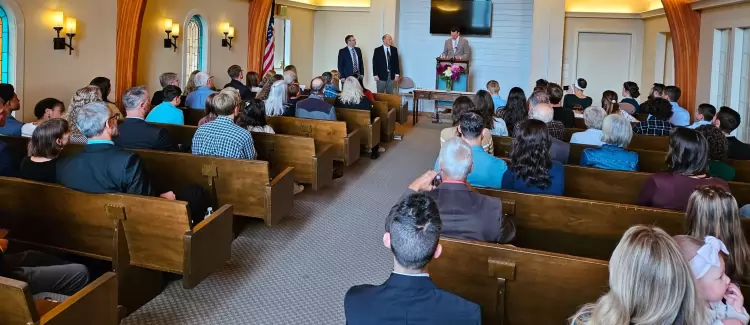Our Worship
We worship together on Sundays at 9:30 AM (Communion Service) & 11:15 AM (Catechism Service) at Lighthouse Christian School, 3008 36th St NW, Gig Harbor, WA. To get a feel for what our worship services are like, check out the past video recordings of our services on our Youtube page.
What is a Communion Service?
In this service, God is renewing his covenant bond with his people through His Word and Sacraments. The primary goal of this service is not to be entertained, to receive ammunition to fight conservative or progressive culture wars, nor is it to accumulate more facts about the Bible. Rather, the goal of this service is to be struck down by the law and built up in grace by the gospel as it is proclaimed in the Word and experienced physically in the Lord’s Supper. Ordinarily, in this service, a biblical book will be preached passage by passage so that the congregation can receive a close examination of the “trees” of Scripture.
What is a Catechism Service?
One of the historic practices of confessional Protestant churches was to hold a second service on the Lord's Day devoted to the exposition of a catechism for the instruction of the laity. The Medieval Church had neglected the important practice of catechizing the church and thus Martin Luther once quipped, “We have a catechism in the pulpit, something that has not happened in over a thousand years!” Thus, in our Catechism Service, the primary goal is the instruction of God’s people, especially the children, in the basic doctrines of the Christian faith. The sermons in this service will ordinarily be devoted to expositing the Word of God through the lens of our Reformed confessions and catechisms. One could say that the goal of these sermons is to examine the “forest” of scripture. Ordinarily, our pastor will begin his sermon with review questions from our catechism for our children to answer. This practice is rooted in our belief that the catechesis of our children begins in our Catechism Service and should be reinforced in the home during the week.
Is your worship traditional or contemporary?
Rather than using the categories of “traditional” or “contemporary,” we prefer to describe our worship as being biblical. We believe that what goes on in worship is not mere preference. Scripture teaches that God is the one who dictates how He is to be worshipped, and thus, we believe that He is to be worshipped according to His Word (Col. 2:20-22; Exod. 20:4-6). Although there may be aspects to our service that seem strange or foreign to you, we want you to know that as a Reformed church we seek to be as biblical as we can in how we worship our Triune God. “How so?” you may ask. Let us explain.
-
We read the Bible. Paul tells pastor Timothy in 1 Tim. 4:13, “devote yourself to the public reading of Scripture.”
-
We preach the Bible lectio continua (Latin phrase meaning “continuous reading”). This means that we ordinarily preach passage by passage through entire books of the Bible. This enables us to preach “the whole counsel of God (Acts 20:27)” and restricts the pastor from preaching his “hobby horse” subjects.
-
We sing the Bible. We seek to be faithful to Paul’s instruction as he says the church is to sing “psalms and hymns and spiritual songs” (Col. 3:16). Therefore, we not only sing the great hymns of the church, whether contemporary or historic, but also sing the canonical psalms which are the only inspired song book of the church.
-
We see the Bible in the sacraments of the Lord’s Supper and baptism. The reading and preaching of the Word are perceived with our ears. The sacraments, which are the gospel in the form of water, bread, and wine, are perceived with our other senses (i.e. sight, smell, touch, taste). Thus, the purpose of God bestowing His church with the sacraments is to further their assurance in His promises.
-
We pray the Bible. Scripture calls us to confess our sins (1 Jn 1:9), offer thanksgiving (1 Thess. 5:18), adore our Triune God (Rom. 11:33-36), pray for the needs of the church (Eph. 6:18-20), pray for our civil government (1 Tim. 2:2), and pray for our own sanctification (Phil. 1:9-11), among many other things. We seek to model this sort of biblical prayer each Lord’s Day.
What is a liturgy, and why do we have one?
A liturgy is simply an order of worship. There is a common notion that a liturgy and its accompanying routines, rituals, and habits has a deadening effect upon true Spirit-filled worship. The fact of the matter is every church has a liturgy; that is every church has an order by which they seek to worship God. The important question is how biblical and thought out one's liturgy is. A helpful analogy here is that of a trellis and a vine. A trellis by itself does not make a vine grow, but when you have a growing vine, a trellis is tremendously helpful. Similarly, if one compares the trellis to the liturgy and the vine to true, Spirit-filled worship, the liturgy itself does not produce true worship. However, when the Spirit of God is in our midst and is producing true worship, a liturgy is a helpful tool to guide our worship so that we may do all things “in decency and in order (1 Cor 14:40).” Our liturgy is composed of the reading, preaching, singing, seeing, and praying of the Bible. Furthermore, the structure of our liturgy reflects our belief that worship is a dialogue between God and His people. God speaks to His people in His Word, and His people respond by confessing their faith, singing, and praying.

